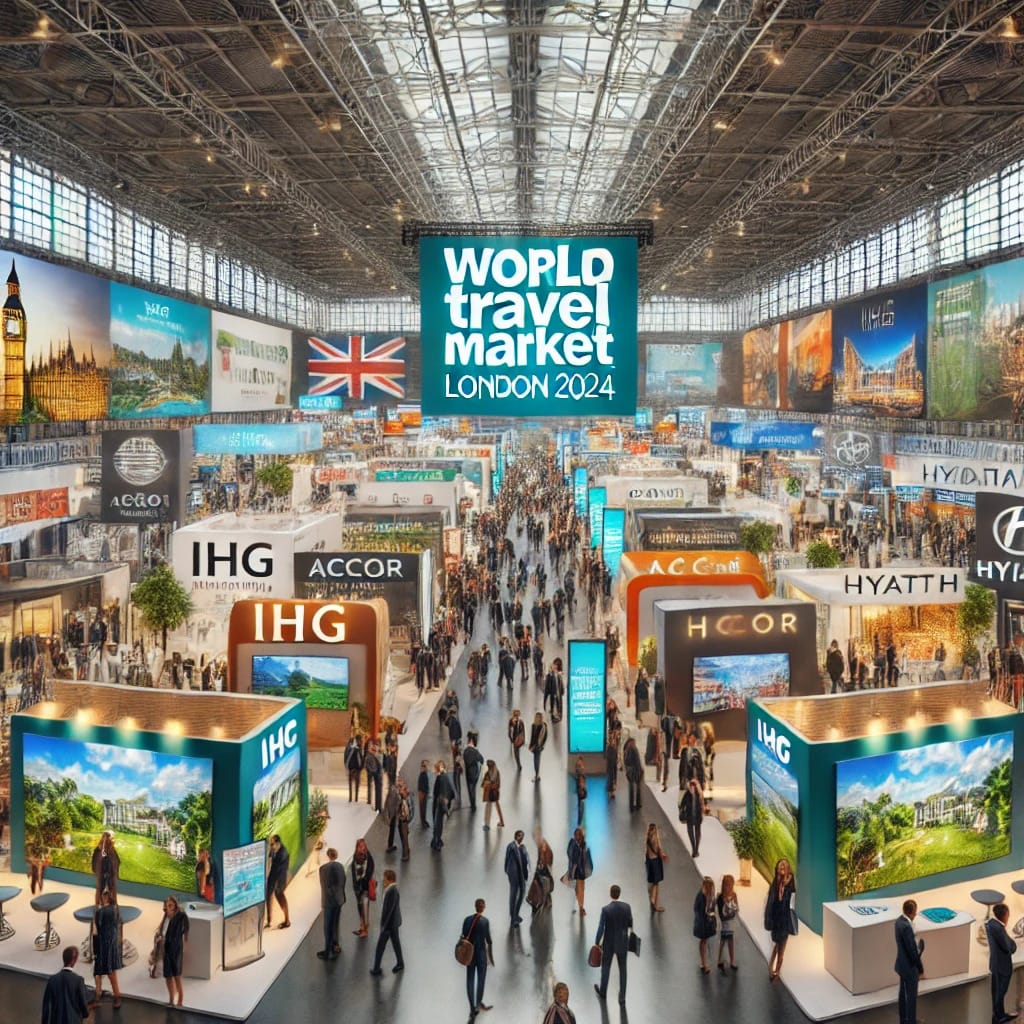Future of Hospitality: How IHG, Accor, Hilton, Hyatt, and Wyndham are Shaping the Industry at World Travel Mart London 2024

Future of Hospitality: Key Trends from World Travel Mart London 2024
The World Travel Mart (WTM) London 2024 gathered some of the hospitality industry’s most prominent brands — including IHG, Accor, Hilton, Hyatt, and Wyndham — to present innovations that will shape the future of travel and hospitality. This year’s showcase highlighted major trends like technology integration, sustainability efforts, wellness-focused amenities, customer loyalty programs, and hotels’ role in tourism and economic development. Together, these themes reveal the industry’s shift toward creating personalized, environmentally responsible, and highly connected guest experiences that align with modern expectations.
Technology and Innovation in Hospitality at World Travel Mart London
In recent years, technological advancements have become fundamental to enhancing guest experiences and operational efficiency within the hospitality industry. At WTM London 2024, major hotel brands highlighted how smart technologies are reshaping hotel stays to be more seamless and customized. For example, many hotels now offer mobile apps that allow guests to check in, unlock rooms, and manage room settings such as lighting, temperature, and even room service orders through their smartphones. Hilton’s Digital Key and similar innovations provide guests with contactless, convenient options, reducing the need for physical interactions while enhancing control and privacy.
The role of Artificial Intelligence (AI) in hospitality was another focal point. AI-driven systems allow hotels to collect and analyze guest data, enabling personalized service delivery based on individual preferences and habits. By understanding guests’ behaviors and needs, hotels can offer tailored amenities, from room selection and temperature settings to dining and activity recommendations. Accor and IHG are leaders in this area, utilizing AI to refine guest experiences while improving operational efficiencies.
Hotels are also implementing automation to streamline services, such as robotic concierges that assist in tasks like delivering room service, allowing staff to focus on more personalized guest interactions. These advancements meet growing expectations for efficiency and convenience while addressing post-pandemic concerns around hygiene and safety. Additionally, property management systems (PMS) and revenue management tools help brands like Hyatt and Wyndham make data-driven decisions on pricing and inventory, allowing for optimized service delivery and competitive positioning.
As hotels showcase these innovations at World Travel Mart London 2024, it’s clear that technology is not just enhancing convenience but also reshaping the hospitality industry’s very foundation. For guests, it promises a more personalized, efficient, and enjoyable experience, while for hotels, it means staying competitive in an increasingly digital and data-driven world.
Commitment to Sustainability and Wellness
With the rise in environmental consciousness, sustainability has moved to the forefront of the hospitality industry. Major brands are adopting eco-friendly practices to reduce their environmental impact, from cutting energy and water use to reducing waste and sourcing sustainable materials. For instance, IHG’s Green Engage program helps properties monitor and minimize their carbon footprint, while Accor’s Planet 21 initiative encourages waste reduction, water conservation, and the elimination of single-use plastics. By showcasing these initiatives at WTM London, IHG and Accor emphasize their commitment to environmental responsibility, which is increasingly valued by eco-conscious travelers.
Alongside sustainability, wellness has emerged as a significant trend, especially as travelers prioritize health-focused experiences. Hotels are responding with wellness-centered facilities and services, such as on-site spas, organic dining options, and wellness-focused room designs. Hyatt’s Wellbeing initiative exemplifies this trend, offering amenities like in-room yoga mats, guided meditation apps, and healthy meal options to help guests maintain their wellness routines while traveling. Wyndham and Hilton have also invested in wellness-oriented offerings, including fitness centers, sleep-focused room designs, and outdoor activity access.
These sustainability and wellness initiatives reflect a broader shift toward responsible and health-conscious hospitality. By adopting green practices and providing wellness amenities, hotels are not only reducing their environmental footprint but also enhancing guest satisfaction, appealing to travelers who seek holistic and sustainable experiences.
Customer-Centric Programs and Offers
In an industry where loyalty can be fleeting, customer-centric programs play a crucial role in retaining guests. Leading brands like Wyndham, Hilton, and Accor have developed comprehensive loyalty programs that reward repeat customers and enhance their experiences. For instance, Wyndham Rewards allows guests to earn points for every stay, redeemable for free nights, upgrades, and other perks, catering to value-conscious travelers who appreciate consistent rewards. Similarly, Accor Live Limitless (ALL) and Hilton Honors offer members exclusive benefits, including discounts, special offers, and personalized experiences, reinforcing customer loyalty.
Loyalty programs are no longer solely about offering points but also about providing personalized experiences. At WTM London 2024, Hilton emphasized new loyalty features, such as exclusive events and tailor-made offers, that go beyond traditional perks. By focusing on experience-based rewards, hotels appeal to guests seeking unique and memorable stays.
In addition to loyalty programs, hotel brands frequently offer targeted discounts and promotions to attract both new and returning customers. For example, Wyndham regularly provides discounts through its website, while IHG offers special rates for loyalty members. These offers enhance accessibility for cost-conscious travelers and provide incentives for guests to book directly through brand websites, helping hotels maintain customer loyalty and increase direct bookings.
The emphasis on loyalty and personalized offers demonstrates the hospitality industry’s commitment to building long-term relationships with guests. These customer-centric programs not only benefit travelers but also drive brand loyalty, making guests more likely to return and recommend the brand to others.
The Role of Hotels in Tourism and Global Hospitality
Hotels are a cornerstone of the tourism industry, contributing significantly to local economies and enhancing the appeal of destinations. By providing a gateway to local culture and attractions, hotels act as ambassadors for their regions, connecting guests with authentic experiences. At WTM London 2024, hotel brands highlight their role in promoting tourism and supporting communities, from partnering with local businesses to offering packages that include discounted access to local attractions.
Major brands like Hilton and Accor often invest in emerging tourism markets, driving infrastructure development and creating jobs. This investment supports regional economic growth, encouraging other businesses to establish themselves nearby. By setting up hotels in key locations, brands like Hyatt contribute to elevating the destination’s profile, attracting a steady stream of tourists and benefiting the local economy.
Additionally, sustainable tourism initiatives demonstrate the hospitality industry’s commitment to responsible tourism. Hotels are adopting practices that minimize their environmental impact, such as energy-efficient buildings, water conservation, and waste reduction. These practices not only help preserve natural resources but also attract travelers who are increasingly mindful of the environmental impact of their trips.
Through these efforts, hotels reinforce their essential role in global tourism, positioning themselves as key players in sustainable, economically beneficial, and culturally enriching travel experiences. The insights shared at World Travel Mart London highlight how hotels serve as both accommodation providers and significant contributors to tourism growth, promoting responsible and meaningful travel.
Conclusion of the World Travel Mart London 2024
The World Travel Mart London 2024 conference underscores how the hospitality industry is evolving to meet modern demands. Brands like IHG, Accor, Hilton, Hyatt, and Wyndham are embracing technology, sustainability, wellness, and customer-centricity to create enhanced, personalized, and environmentally responsible guest experiences. Through digital innovations such as smart rooms, mobile check-in, and AI-driven personalization, hotels are catering to tech-savvy travelers who seek seamless, customized interactions. Simultaneously, sustainability programs and wellness amenities address the growing demand for eco-conscious and health-focused travel options.
Loyalty programs and special offers underscore the importance of customer retention in today’s competitive landscape, encouraging repeat visits and building lasting relationships with guests. Finally, the role of hotels in supporting tourism and the local economy is more crucial than ever, with sustainable tourism initiatives helping to protect destinations for future generations.
By showcasing these initiatives at World Travel Mart London 2024, leading hotel brands are not just adapting to change but actively shaping the future of hospitality. As travelers increasingly value sustainability, personalization, and technology, these trends will continue to redefine hospitality, creating a more inclusive, responsible, and guest-centric industry.








Your article helped me a lot, is there any more related content? Thanks! https://accounts.binance.com/es/register-person?ref=RQUR4BEO
I don’t think the title of your article matches the content lol. Just kidding, mainly because I had some doubts after reading the article.
Thanks for shening. I read many of your blog posts, cool, your blog is very good.
Can you be more specific about the content of your article? After reading it, I still have some doubts. Hope you can help me. https://www.binance.com/ph/register?ref=IU36GZC4
Thank you for your sharing. I am worried that I lack creative ideas. It is your article that makes me full of hope. Thank you. But, I have a question, can you help me?
Thank you for your sharing. I am worried that I lack creative ideas. It is your article that makes me full of hope. Thank you. But, I have a question, can you help me?
Your point of view caught my eye and was very interesting. Thanks. I have a question for you.
Fantastic beat I would like to apprentice while you amend your web site how could i subscribe for a blog site The account helped me a acceptable deal I had been a little bit acquainted of this your broadcast offered bright clear concept
I was recommended this website by my cousin I am not sure whether this post is written by him as nobody else know such detailed about my trouble You are amazing Thanks
I do not even understand how I ended up here, but I assumed this publish used to be great
“What a gem I’ve discovered! The thoroughness of your research combined with your engaging writing style makes this post exceptional. You’ve earned a new regular reader!”
My brother suggested I might like this website He was totally right This post actually made my day You cant imagine just how much time I had spent for this information Thanks
“Amazing post, keep up the good work!”
Good post! We will be linking to this particularly great post on our site. Keep up the great writing
I have been browsing online more than three hours today yet I never found any interesting article like yours It is pretty worth enough for me In my view if all website owners and bloggers made good content as you did the internet will be a lot more useful than ever before
Usually I do not read article on blogs however I would like to say that this writeup very compelled me to take a look at and do it Your writing style has been amazed me Thank you very nice article